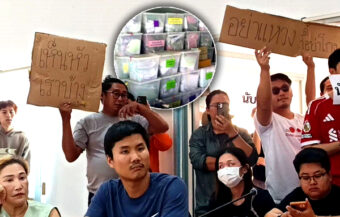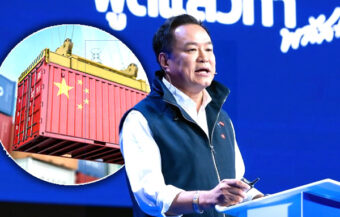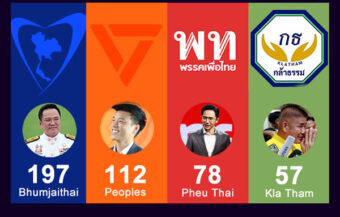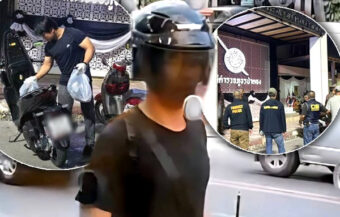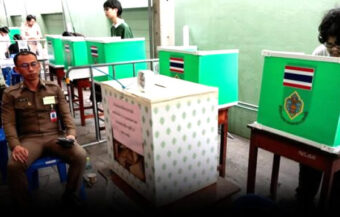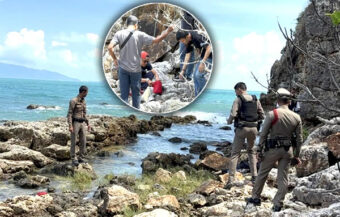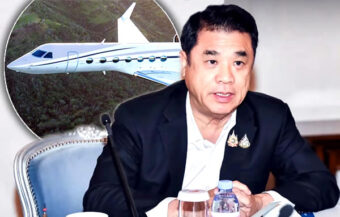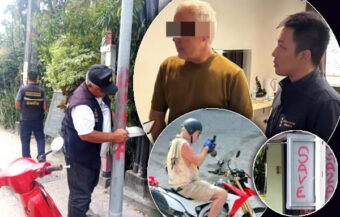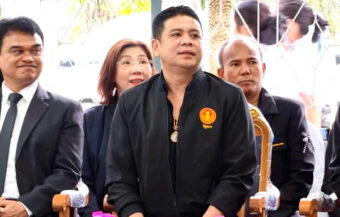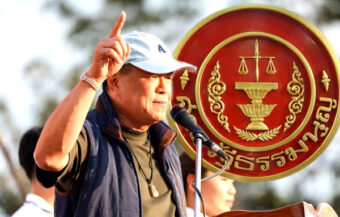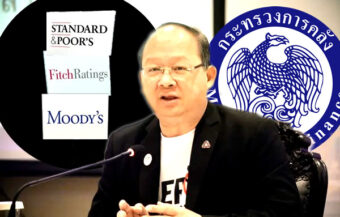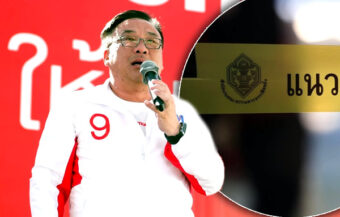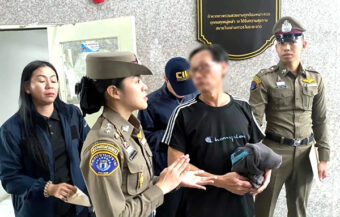New Tourism and Sports Minister Atthakorn Sirilathayakorn announces a bold plan to revive Thailand’s tourism industry by shifting focus to Asia and the Middle East, promoting sports, enhancing AI security, and hosting high-profile events to boost visitor numbers and confidence.
New Tourism and Sports Minister Atthakorn Sirilathayakorn on Friday overturned his ministry’s earlier plan to target long-haul travellers, especially from Europe. He also said he would reconsider the previous Pheu Thai government’s proposal for Thailand to host a Formula Grand Prix event. Instead, Atthakorn, who met the Chinese Ambassador alongside Deputy Prime Minister Thamanat Prompow, said Thailand will focus on Asian and Middle Eastern markets. The ministry will also ramp up joint policing of tourist areas, using artificial intelligence, and promote Thailand as a global sports hub for hosting events.
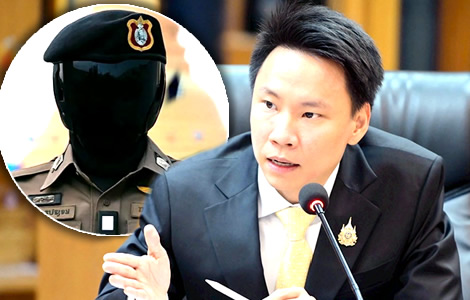
Newly installed Minister of Tourism and Sports Atthakorn Sirilathayakorn announced on Friday a bold plan to revive Thailand’s tourism industry. He emphasised that the government’s strategy aims both to enhance the kingdom’s international image and to promote sports as a key attraction.
Moreover, Atthakorn said that the government will shift its focus to Asian and Middle Eastern markets, signalling a clear departure from the previous policy, announced months ago, of targeting long-haul travellers. Previously, officials had concentrated on tourists who spend heavily, but now the priority is to rebuild confidence across Asia and the Middle East.
Tourist arrivals have already shown a sharp decline this year. So far, numbers are down 7.1% compared to last year. The decline is more pronounced in Northeast Asia, which dropped by 25%.
Thailand sees a sharp 7.1% fall in tourist arrivals, especially from Northeast Asia, this year compared to last
Similarly, the ASEAN bloc saw an 8% reduction. On the other hand, European visitors rose by an impressive 15%, while travellers from the Americas increased by 8%. Consequently, the data shows an uneven recovery and highlights areas requiring urgent attention.
Several factors contribute to this decline. Firstly, online criticism, particularly from Chinese social media audiences, has damaged Thailand’s reputation. The country is often portrayed as unsafe due to high-profile murders, scams, abductions and ransom kidnappings.
Furthermore, there are concerns that Chinese criminal networks have exploited Thailand since the introduction of the free visa policy in 2024 under Prime Minister Srettha Thavisin. Therefore, rebuilding trust among international tourists has become a critical priority for the government.
In response, Atthakorn and Deputy Prime Minister Thamanat Prompow plan high-profile visits to key Asian capitals, beginning with Beijing. These trips aim to boost tourism numbers ahead of the high season.
Atthakorn and Thammanat plan high-profile visits to Asian capitals to boost tourist numbers ahead
In addition, the visits are designed to reassure tourists and investors that Thailand is serious about safety and comfort. Notably, senior ministers will travel with them to strengthen confidence in person.
Part of the campaign will also highlight Thailand as a venue for high-profile sporting events. Additionally, the government will introduce a new artificial intelligence program, piloted by the Royal Thai Police, to track and identify criminals. This AI system will operate across major tourist hotspots and will link to carefully collected data on foreign arrivals. Consequently, officials expect heightened security and increased tourist confidence.
During his first official visit to the Ministry of Tourism and Sports, Atthakorn paid respects at the ministry’s spirit house, accompanied by his father, Itthi Sirilathayakorn, former Deputy Minister of Agriculture and Cooperatives.
He explained that the strategy includes short-term and long-term objectives. Short-term goals focus on reviving international tourist numbers near pre-pandemic levels. At the same time, long-term goals aim to stimulate domestic tourism, ensuring consistent economic impact.
Ministry strategy focuses on short-term revival of international tourists and long-term domestic growth
Atthakorn stressed that the upcoming four months are critical. “We must accelerate foreign tourist growth,” he said. “Although difficult, we will prioritise markets with potential and directly address the causes of decline.” He added that government funds will be deployed to serve the nation, not individuals. Therefore, transparency and accountability will guide all efforts.
The minister highlighted key target markets for immediate action. China, Japan, Korea, India and Saudi Arabia are primary priorities.
Furthermore, officials plan outreach to other Middle Eastern markets. To ensure effectiveness, senior executives will travel to these countries to build relationships directly. For example, a visit to China with Deputy Prime Minister Thammanat Prompow will focus on tourism and agriculture cooperation.
In addition, ministers will meet local officials to provide reassurance on safety and comfort for visitors.
Atthakorn outlines key target countries and outreach plans to reassure tourists on safety and comfort
Atthakorn cautioned against overpromising. “We set realistic goals, not impossible missions,” he said. “Acknowledging this year’s decline is essential before attempting recovery.” By doing so, businesses can plan without relying on unrealistic projections, preventing further setbacks.
Alongside foreign outreach, Atthakorn will revive domestic tourism initiatives. Successful programs such as “Half-Half Thailand” and “We Travel Together” will return, updated to maximise impact. Instead of launching untested initiatives, only projects with 70-80% past success will be revived.
Remaining funds from previous programs will be submitted to the Cabinet for approval, ensuring efficiency. These efforts will stimulate domestic travel while supporting local businesses.
Additionally, Thailand will host the 33rd Southeast Asian Games. Atthakorn described this as a prime opportunity to showcase Thailand on the world stage. The allocated ฿2,055 million budget will be used efficiently, and additional funding will be sought if necessary. Moreover, he stressed that hosting the SEA Games must complement broader tourism and economic objectives, not divert resources unnecessarily.
Thailand aims to maximise impact of SEA Games while ensuring funds are used efficiently for tourism growth
Soft power strategies will complement these efforts. “We aim for natural influence, not forced campaigns,” Atthakorn said. Plans for Formula One Grand Prix races will be considered carefully, balancing investment against national priorities.
Asked about personal recognition, he replied: “No need to remember me. Just remember that Thailand can generate income from tourism and build a positive image in sports. That’s enough.”
A major AI security initiative has been launched to attract two million Chinese tourists. The system, called AI Detect, is operated by the Tourist Police. It uses facial recognition to scan crowded areas and cross-reference individuals against arrest warrants. Officers will monitor high-risk or suspicious persons, protecting visitors and enhancing confidence in Thailand as a safe destination.
Tourist Police services will be strengthened nationwide. The 1155 Emergency Hotline will operate 24/7. In addition, the Thailand Tourist Police app, now live, supports eight languages, including Chinese, English, Japanese, Korean, and Russian. Tourists can report incidents, request information, or send an SOS directly to police command centres. Therefore, visitors have access to immediate support and guidance at all times.
AI security initiative and enhanced police services aim to ensure safe tourism for millions of visitors
Officials will also conduct a thorough review of domestic and international tourism-related crime statistics. Safe zones will be publicised, ensuring tourists know where security is highest. Coordinated efforts will involve the Department of Tourism, Tourist Police Command, Tourist Assistance Centre, and the Tourist Assistance Coordination Centre. In total, 274 officers will be stationed across 79 strategic locations to support the SEA Games and high-season tourism.
On September 26, Chinese Ambassador Zhang Jianwei met with Thammanat Prompow and Atthakorn Sirilathayakorn. He congratulated both officials on their new cabinet appointments.
Ambassador Zhang reaffirmed China-Thailand strategic cooperation, emphasising tourism and agriculture. Both Thai officials welcomed him and praised prior collaboration. They highlighted the potential for increased exports of Thai agricultural products to China and expanded Chinese tourist arrivals. These discussions emphasised the importance of bilateral ties in supporting national economic and cultural goals.
Chinese ambassador meets Thai ministers to strengthen tourism and agriculture cooperation
Atthakorn later underlined to reporters that coordinated strategies remain central to recovery. Short-term actions focus on immediate tourism growth, while long-term initiatives ensure sustainable expansion. Domestic programs, enhanced security and international engagement are all components of a comprehensive plan to restore Thailand’s position as a leading tourist destination.
Motorcycle thief arrested in Songkhla for snatching a bracelet from a tourist at speed on public taxi
Thailand’s once mighty tourism industry is failing but now faces further damage from overvalued baht
Tourism chief targets European tourists in the second half of 2025 while cabinet orders shorter visas for holidaymakers
The government also intends to maximise the impact of major events, such as the SEA Games, using them to strengthen international recognition. By integrating domestic and international efforts, Thailand aims to rebuild confidence among tourists and investors alike. As a result, officials hope to achieve a resilient, diversified, and sustainable tourism sector.
Finally, Atthakorn concluded with a clear message of accountability and national purpose. “Our mission is to benefit Thailand, not individuals,” he said. “Tourism and sports can generate income and strengthen our international image. That is our ultimate goal.” With these measures, the Ministry of Tourism and Sports aims to ensure that the high season delivers safety, enjoyment and positive experiences for millions of international visitors.
Join the Thai News forum, follow Thai Examiner on Facebook here
Receive all our stories as they come out on Telegram here
Follow Thai Examiner here
Further reading:
Thailand’s once mighty tourism industry is failing but now faces further damage from overvalued baht
Rate cut anticipated as outgoing Bank of Thailand governor attends last Monetary Policy Committee
Last minute tweaks in Bangkok as deal is finalised with U.S. However, Thailand may not match Vietnam


